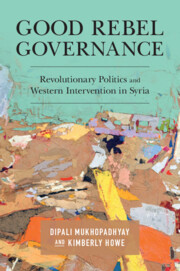Book contents
- Good Rebel Governance
- Good Rebel Governance
- Copyright page
- Contents
- Figures
- Acknowledgments
- 1 Introduction
- 2 The “Good Governance Bazaar”
- 3 Reconceptualizing Rebel Governing Authority
- 4 Studying Syria “from the Verandah”
- 5 Raqqa’s Caliphal Social Contract
- 6 Saraqeb’s “Limited Access Order”
- 7 The Fervent Enclave of Darayya
- 8 Aleppo’s Republican Guild
- 9 The Syrian Interim Government as “Floating” Counter-State
- 10 Revolutionary Possibilities and International Imaginings
- Notes
- Select Bibliography
- Index
5 - Raqqa’s Caliphal Social Contract
Published online by Cambridge University Press: 01 June 2023
- Good Rebel Governance
- Good Rebel Governance
- Copyright page
- Contents
- Figures
- Acknowledgments
- 1 Introduction
- 2 The “Good Governance Bazaar”
- 3 Reconceptualizing Rebel Governing Authority
- 4 Studying Syria “from the Verandah”
- 5 Raqqa’s Caliphal Social Contract
- 6 Saraqeb’s “Limited Access Order”
- 7 The Fervent Enclave of Darayya
- 8 Aleppo’s Republican Guild
- 9 The Syrian Interim Government as “Floating” Counter-State
- 10 Revolutionary Possibilities and International Imaginings
- Notes
- Select Bibliography
- Index
Summary
As the Syrian uprising took a violent turn, armed fighters and civilian leaders alike carved out insurgent micropolitical economies across the country’s contested territories. Raqqa City was the first provincial capital to fall from the regime’s control into the hands of opposition forces. The city elected its first opposition council, the Raqqa city council, in early 2014, but the council proved short-lived. By mid-2014, a zealous band of foreign fighters had consolidated control over the city with the aim of establishing a caliphate that would transcend the Westphalian state system and manifest an extreme vision of Islamic rule. These aspiring governors quickly established a monopoly over coercion and availed themselves of a range of capital assets through access to natural resources, looting, and various forms of taxation in the service of their state-building effort. Our close reading of accounts from the city of Raqqa between 2014 and 2016 revealed the corresponding emergence of tight forms of social control as well as the demonstrated capacity to deliver a wide array of key services. In these ways, the so-called Islamic State proved to be a paragon of rebel governance, mobilizing key forms of material power to erect a robust new political order.
- Type
- Chapter
- Information
- Good Rebel GovernanceRevolutionary Politics and Western Intervention in Syria, pp. 68 - 85Publisher: Cambridge University PressPrint publication year: 2023



